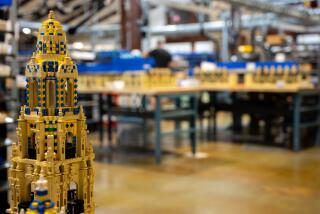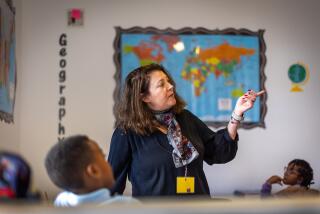Firm Learns by Doing--and Failing
- Share via
Educational toy company executives Brooke Abercrombie and John Sosoka could write a textbook on how not to run a business.
They hired a factory that specialized in plastic figurines to make their first product, a sophisticated electronic toy that allows toddlers to compose songs. Lengthy production delays put Music Blocks a year behind schedule.
When Music Blocks finally shipped last year, Abercrombie and Sosoka nearly triggered a revolt among specialty toy store owners by also supplying it at a discount to the Costco warehouse chain.
But the founders of Long Beach-based Neurosmith learned from their mistakes. And legions of doting parents rewarded them last year by snapping up Music Blocks at $69, pushing it onto best-seller lists at specialty stores.
“It is the best toy I ever had,” said Carol Seymour, co-owner of Star Toys in Brentwood, which sold 280 of them during the holiday season.
Neurosmith shows how hard work, talent and a dose of humility can pull entrepreneurs through near-fatal errors. Little in their careers as software executives prepared Abercrombie and Sosoka for the toy business.
“We didn’t know what we didn’t know,” Abercrombie said.
Alumni of Math Blaster creator Davidson & Associates, Abercrombie and Sosoka formed Neurosmith in 1997 to bring what they knew about child development to the toy business. Abercrombie, 34, is a Harvard MBA who headed up software production at Davidson. Sosoka, 46, an electronics whiz who never graduated from college, oversaw software development as Davidson’s chief technology officer.
Located in a cramped second-story suite in trendy Belmont Shore, Neurosmith is a lean operation. There is no receptionist to greet visitors. Two employees who handle shipping and customer service occupy a stripped-down front office.
Sosoka, a burly man with a full beard, builds prototypes in a converted storage closet. Tools and hardware hang neatly from a peg board above his workbench. Abercrombie, a model of thrift, equipped her office with spare furniture from home. Shelves brim with child-development books and toys made by competitors VTech and Leap Frog that she purchased to get a closer look.
In developing Music Blocks, Neurosmith’s founders said, they assumed electronic toys were as easy to manufacture as software, which is highly standardized. They found out the hard way that smart toys require special production skills.
Weeks before Thanksgiving 1998, Abercrombie visited the factory in China and found it woefully behind schedule. To save money and time, the contractor discarded parts that enhanced the sound made by the toy. In desperation, Abercrombie took a spot in the assembly line and helped solder toys.
On Dec. 5--Abercrombie remembers the date exactly--Neurosmith pulled the plug on the holiday season.
“They couldn’t make a toy that worked,” she said. “It was brutal.”
Abercrombie apologized to retailers and promised to protect those who kept their orders in place from any price increases. Of the 250 merchants who had ordered Music Blocks, only 20 canceled orders, Abercrombie said.
Neurosmith’s investors also remained patient. Their former bosses, Bob and Jan Davidson, invested $5 million in Neurosmith. The Davidsons sold their company in 1996 for $1.2 billion to CUC International, now called Cendant Corp.
“We’re not out to make a quick Internet dollar,” Bob Davidson said. “We know how passionate they are about their work. . . . They’ve come a long way in a short time.”
Neurosmith hired a factory experienced with digital toys and turned the delay to an advantage. With no money for advertising, Neurosmith used low-budget PR tactics to create a buzz for the toy. With PR chief Angela York, Abercrombie last summer called on New York magazine publishers who compile holiday best-toy lists. Family Fun, Child and Parents each gave Music Blocks a valuable plug.
The result: Neurosmith entered the holiday season with orders for Music Blocks from 5,000 stores.
Despite the preparations, Neurosmith ran into unexpected glitches. A computer chip shortage resulted in many unfilled orders of another Neurosmith toy, Little Linguist. And Neurosmith upset specialty store customers when it agreed to supply Music Blocks to Costco, formerly an important Davidson & Associates customer. Neurosmith eventually yanked Music Blocks from Costco to appease toy store owners.
“Hindsight is 20-20,” spokeswoman York said. “With software, it didn’t matter. Now we know.”
Neurosmith still has plenty to worry about. Rivals Leap Frog and VTech have phonics, music and math toys that occupy whole sections in specialty stores. Microsoft and Fisher-Price, industry giants with deep pockets, have teamed to produce an all-in-one toy that teaches children about letters, numbers, colors and musical concepts.
But the dynamics of the toy business favor small companies such as Neurosmith, which said 1999 sales were less than $10 million. Specialty toy stores ranging from neighborhood shops to national chains need innovative products to set themselves apart from Wal-Mart, Toys R Us and other mass merchants.
“Strong, high-quality product is important to us,” said Tom Vellios, president of Zany Brainy, a 103-store chain. Regarding Neurosmith, he said, “If they continue to develop unique product, they can be successful.”
At the Toy Fair in New York last month, Neurosmith intrigued toy buyers with Babbler, an unusual $49 infant toy that emits sounds in three languages when touched. Inspired by theories about how infants learn, Babbler represents the sort of toy Neurosmith wants to develop, a blend of electronics and science. It randomly produces sounds unique to French, Spanish and Japanese that infants in English-speaking homes aren’t likely to hear. Morten Christiansen, a neuroscientist at Southern Illinois University and paid advisor to Neurosmith, said a child’s ability to recognize alphabet sounds declines after age 1.
“A lot of companies pay lip-service,” Christiansen said. “They went to the sources and actually considered the data.” But he acknowledged there is no proof Babbler is an effective teaching tool.
Abercrombie said Babbler doesn’t have to be a blockbuster to succeed. “If all we do is go after big numbers, in the long run, we won’t get to new products,” she said. “The research, the work--it all makes us better at doing things.”
(BEGIN TEXT OF INFOBOX / INFOGRAPHIC)
Entrepreneurial ABCs
In the educational-toy business, grown-ups sometimes have lessons to learn, as Neurosmith founders Brooke Abercrombie and John Sosoka discovered.
* Get contractors with the right skills: Neurosmith missed shipping deadlines because it hired a factory that specialized in plastic figurines to make Music Blocks, a complicated digital plaything.
* Look for the silver lining: Neurosmith turned production delays to its advantage by using the time to build a buzz for Music Blocks.
* Know your customer: Neurosmith sold Music Blocks to Costco, and was suprised when specialty toy stores complained. It shouldn’t have been.
* Find investors who share your vision: Neurosmith has room to make mistakes because its financial backers believe in the company and its founders.
More to Read
Inside the business of entertainment
The Wide Shot brings you news, analysis and insights on everything from streaming wars to production — and what it all means for the future.
You may occasionally receive promotional content from the Los Angeles Times.










